According to Consumer Reports, a whopping 68 percent of Americans struggle with sleep at least once per week. And even worse, 27 percent said that they have trouble falling or staying asleep most nights. (1)
So if you find that it takes a while to fall asleep, you are not alone.
Sleep is an essential part of our life because it allows our body and brain to rest, recharge, and reset so we can have a productive day. Without enough hours of sleep, our energy levels, mood, brain activity, and overall health suffer.
Aside from that, many get desperate and turn to prescription sleeping pills to try to fix the issue. This only leads to more problems. Often, prescription pills have dangerous side effects and don’t even help people feel rested and rejuvenated.
The best way to get better sleep is to address the issues that are causing sleepless nights with healthy sleep habits.
Contents
Why Are So Many Having Sleep Problems?
Well, there are a lot of factors that could be causing it. Some of these causes include large amounts of caffeine, longer work days, increased stress, and extended use of electronic devices.
In this article, we give you 7 tips for better sleep that you can learn and put in to practice today! They will begin to help you fall asleep faster and sleep longer.
How To Get Better Sleep
This list of 7 different ways to sleep better have all been recommended by various sleep doctors.
By implementing these, you should notice that you will begin to have uninterrupted and more restful sleep. If a few of these sleep tips are hard to do, that is alright. Just do your best to be a little bit more mindful in each area.
1. Keep a Regular Sleep Schedule
 How to get a good night sleep starts with your schedule. Having a regular sleep schedule signals to set our circadian rhythm. According to the National Sleep Foundation, our circadian rhythm is a 24-hour internal clock that is running in the background of our brain that helps to set our sleep and wake cycles. The hypothalamus is the part of the brain that is responsible for setting this sleep rhythm. (2)
How to get a good night sleep starts with your schedule. Having a regular sleep schedule signals to set our circadian rhythm. According to the National Sleep Foundation, our circadian rhythm is a 24-hour internal clock that is running in the background of our brain that helps to set our sleep and wake cycles. The hypothalamus is the part of the brain that is responsible for setting this sleep rhythm. (2)
By having regular hours of bedtime and waking time, this keeps the circadian rhythm constant. Then our brain will automatically tell our body when it is time to be awake and time to sleep.
It is also necessary that this schedule is maintained on the weekends as well. So try not to skip weekends by having extra late nights or sleep in on Saturday and Sunday!
2. Go To Bed In Total Darkness
Darkness is the next signal for your body to go to sleep. According to scientists, when it gets dark, your pineal gland begins to secrete melatonin. This hormone, known as the “hormone of darkness” serves as a way to set the circadian rhythm.(3)
An article in Time magazine even described a study where exposure to low-level light while sleeping was linked to depression.(4)
To help maximize melatonin secretion, make the room as dark as possible. Some steps to help create a dark environment include covering up your cell phone and alarm clocks, installing blackout curtains, and using sleep masks.
3. Limit Blue Light Exposure at Night
 As our dependence on cell phones and computers rise, we lose track of how much time we are looking at screens. Couple that with the fact that more energy efficient lighting emphasizes the blue frequency spectrum, and that creates a serious issue that disrupts the quality of your sleep.
As our dependence on cell phones and computers rise, we lose track of how much time we are looking at screens. Couple that with the fact that more energy efficient lighting emphasizes the blue frequency spectrum, and that creates a serious issue that disrupts the quality of your sleep.
Blue colored light is excellent during the day. It aids in boosting reaction times, attention, and mood. According to the Harvard Medical School, at night it could be dangerous and could create sleep problems.(5)
Some tips that they recommend to get a good night’s sleep include using red lights at night, avoiding screens at least 2 hours before bed, and consider purchasing blue blocking glasses if you have a lot of nighttime light exposure.
4. Exercise
According to John Hopkins Medical School, exercising for at least 30 minutes a day will help you sleep better and decrease insomnia.
Although they mention that exercise helps stabilize your mood and decompresses the mind, they are unsure exactly how it helps to improve sleep. But they do know that moderate aerobic exercise increases the amount of slow wave and rem sleep that you get. (9)
If you want to see all the other benefits of starting an exercise program, check out naturemadecures.com/resistance-strength-training-program/.
They do mention that certain people may have difficulty falling asleep if they work out at night. This is probably due to elevated body temperature and heart rate. So, if this happens to you, make sure you exercise early in the day.
5. Develop a Before Bedtime System
Developing a pre-bedtime routine can help ease the transition from awake to sleep. Doing stress-relieving activities such as light reading or meditation can serve as a way to clear your mind and reduce stress which will help improve your sleep.
This will also serve to help you follow the above recommendations. In this time, try to avoid mental and physical exertion. The goal is to get your body into a calm state using relaxation techniques. Also, keep it free of bright lights.
6. Replace Old Bedding
 Often, many of us are sleeping on an old bed that is ruining our quality of sleep. Experts say that our mattresses should be changed every 7-10 years and our pillows should be changed every 6-36 months.
Often, many of us are sleeping on an old bed that is ruining our quality of sleep. Experts say that our mattresses should be changed every 7-10 years and our pillows should be changed every 6-36 months.
Old bedding not only has structural issues but also is filled with dirt and dust mites, which can cause breathing concerns. If you notice any problems like sagging mattresses or are waking up stiff and sore, they can be signs that it is time to try a new bed.
Ensuring that you have a quality bed and pillows will go a long way in improving sleep and health.
7. Try Natural Sleep Supplements
Because lack of sleep can cause irritability and loss of focus, it can have damaging impacts on our relationships and careers. This only serves to perpetuate the cycle by increasing stress, which leads to less sleep.
It can be a very tough cycle to break. Often times, people turn to prescription pills to help go to sleep at night. Unknowingly, they are inadvertently opening themselves up to a whole new set of health risks. Sleeping pills can be very addictive.
According to the Addiction Center, people taking these dangerous drugs are at risk of overdose, depressed breathing, dizziness, parasomnias, and a whole list of other health concerns. To make matters even worse, users can also experience rebound insomnia once you stop taking the drug.(6) If you know someone with a sleeping pill addiction, help them get the treatment they need.
If you are going to take anything to try and help improve your sleep, there are some supplements worth mentioning.
Lavender
 Lavender is a plant that is known for relaxation and promoting quality sleep. In one study, patients were given a lavender oil capsule. The results showed that it had significantly helped improve sleep over the placebo group.(7)
Lavender is a plant that is known for relaxation and promoting quality sleep. In one study, patients were given a lavender oil capsule. The results showed that it had significantly helped improve sleep over the placebo group.(7)
Also, merely smelling lavender essential oil 30 minutes before bedtime can help with relaxation and sleep. Both the essential oil and lavender supplements are great options.
Magnesium
Many people are deficient in magnesium. This mineral is critical to many of the body’s normal functions. Aside from helping to promote brain function and heart health, it also may be linked to the production of melatonin.
According to Healthline, various studies have shown that it aids in regulating sleep quality. This is especially relevant for people that are prone to magnesium deficiency such as the elderly, diabetics, with alcoholics, and people with digestive issues.(8)
As with any supplementation plan, be sure to consult with your doctor before initiating anything to make sure it is safe for you and to get the correct dosage.
Conclusion
These 7 tips are sure to help you get better sleep. Overall, taking steps to ensure that you have healthy sleep habits will go a long way toward improving your health.
It is much better to tackle the problem naturally than to turn to potentially dangerous sleeping pills.
Finally, it is also a good idea to seek the advice of your doctor. Sometimes, there are underlying medical reasons that are causing your sleepless nights. It is smart to get them tested for immediately so you can begin to improve your sleep.
References:
(1) https://www.consumerreports.org/sleep/…
(2) https://www.sleepfoundation.org/…
(3) https://www.ncbi.nlm.nih.gov/…
(4) https://time.com/5189387/…
(5) https://www.health.harvard.edu/…
(6) https://www.addictioncenter.com/…
(7) https://www.ncbi.nlm.nih.gov/…
